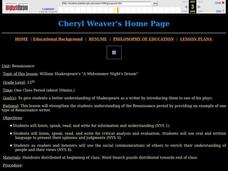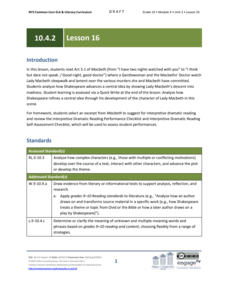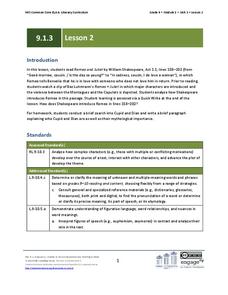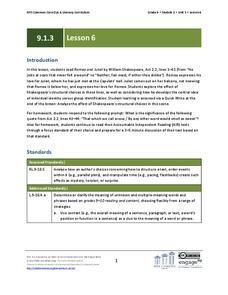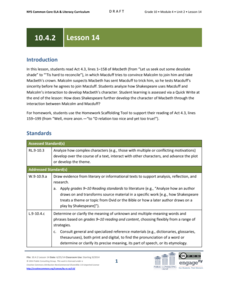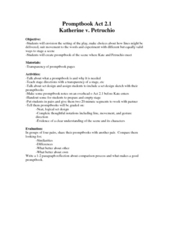Curated OER
So Foul and Fair a Play
Students watch various interpretations of Shakespeare's Macbeth in film. In groups, they examine the setting, characters, music and sequence. They compare and contrast the various films and discuss the differences. They write an essay on...
Curated OER
A Midsummer Night's Dream
You might not be able to put a girdle around the earth in forty minutes but you can generate interest in A Midsummer’s Night Dream in that length of time. As an introduction to Shakespeare’s comedy, pairs of students assume the roles of...
EngageNY
Grade 10 ELA Module 4: Unit 2, Lesson 16
How do complex characters develop throughout a text? Pupils read Act 5.1 from Shakespeare's Macbeth, which depicts Lady Macbeth's descent into madness. Using discussion and writing exercises, scholars analyze how Shakespeare develops...
EngageNY
Grade 10 ELA Module 4: Unit 2, Lesson 6
What decisions might an author make about the structure of a play? Pupils participate in an evidence-based discussion about Shakespeare's choices in Macbeth. Next, scholars analyze the effect of Shakespeare's structural choices in Act 2,...
EngageNY
Author’s Craft: The Poetry of the Play
Feel the rhythm! Pupils begin reading Act 2, Scene 1 of Shakespeare's A Midsummer Night's Dream as they continue participating in a drama circle. With discussion, they examine Shakespeare's use of rhyme, rhythm, and meter, analyzing how...
EngageNY
Grade 9 ELA Module 1: Unit 3, Lesson 2
After viewing a clip from Baz Luhrmann’s Romeo + Juliet in which major characters are introduced, and the violence between the Montagues and the Capulets is depicted, the class reads Act 1, Scene 1, lines 158-202. Groups then analyze the...
EngageNY
Grade 9 ELA Module 1: Unit 3, Lesson 6
The balcony scene from Romeo and Juliet takes center stage as class members consider the structural choices Shakespeare makes, i.e., having Romeo appear first in the scene and having Juliet appear unaware that Romeo is listening to her...
EngageNY
Grade 9 ELA Module 1: Unit 3, Lesson 11
The study of Romeo and Juliet continues as pairs use the provided summary tool worksheet to record evidence of how Shakespeare uses dramatic irony to heighten the tension in Juliet's soliloquy in Act 3, scene 2, lines 1–31.
EngageNY
Grade 10 ELA Module 4: Unit 2, Lesson 15
What goes around, comes around. Using the resource, pupils read Act 4.3 of Macbeth, in which Macduff and Malcolm plan to attack Macbeth. Scholars then hold a discussion and complete writing activities to analyze Shakespeare's structural...
EngageNY
Grade 11 ELA Module 1: Unit 2, Lesson 20
How does the setting impact other elements within a play? Using a helpful resource, scholars explore the question by completing a Quick Write after reading Act 5.1 of Shakespeare's Hamlet. Additionally, they engage in a whole-class...
EngageNY
Grade 11 ELA Module 1: Unit 2, Lesson 6
How does Shakespeare develop the characters of Laertes and Ophelia in Hamlet? Scholars complete a Quick Write to answer the question. They also continue reading and discussing the first act of the play.
K20 LEARN
Words Before Blows: Julius Caesar
Scholars examine how Brutus and Mark Antony employ ethos, pathos, and logos in their speeches to persuade the angry crowd in Act 3, scene 2 of William Shakespeare's tragedy, Julius Caesar. To set the stage, groups first identify the...
EngageNY
Grade 10 ELA Module 4: Unit 2, Lesson 14
How does Shakespeare further develop Macbeth's character using the interaction between Macduff and Malcolm? Pupils write responses to the question. They continue their analysis of Macbeth with a masterful reading and guided whole-class...
EngageNY
Launching A Midsummer Night’s Dream: Identifying the Characters, Settings, and Conflicts
Scholars form a drama circle and begin reading Shakespeare's A Midsummer Night's Dream. They also use a play map to identify the setting, characters, and conflicts from the text.
EngageNY
Analyzing Character and Theme: Tracking Control in A Midsummer Night’s Dream
Scholars examine how characters try to control one another in Shakespeare's A Midsummer Night's Dream. They engage in a read-aloud and class discussion to iron out ideas. They also work in small groups to complete a note-catcher...
Curated OER
Shakespeare's Othello and the Power of Language
Students explore the basis of Iago's persuasive power by analyzing his astonishing command of rhetoric and figurative language. The diverse set of activities below include short group performances, writing exercises and the guided use of...
Curated OER
Promptbook Act 2.1: Katherine vs. Petruchio
Compile a promptbook with your young theater designers using a scene from Taming of the Shrew. The lesson outlines several activities, though it doesn't provide any examples of a promptbook or text from the play. Additionally, it...
Curated OER
William Shakespeare's Julius Caesar: Fate versus Free Will
Tenth graders explore Shakespeare's Julius Caesar. After reading specific scenes, they brainstorm and discuss free will. Students observe a clip from the Dr. Phil television show entitled, "Afraid to Age" and make connections from the...
Curated OER
Much Ado About Nothing: Guided Imagery Exercise
“Be glad that all things sort so well.” To make text-to-self connections to Shakespeare’s play, class members engage in a guided imagery exercise prior to reading Act IV, scene i of Much Ado About Nothing (the wedding of Claudio and...
Curated OER
You Kiss By the Book
Students explore Shakespeare's use of poetic conventions, examine the first meeting between Romeo and Juliet and gain experience in close readng and the interpretation of verse structure and imagery.
Curated OER
Julius Caesar: Act III Reading and Study Guide
In this reading and study guide worksheet, learners define 3 vocabulary words, define 4 literary terms, and respond to 21 short answer questions pertaining to Act III of "Julius Caesar" by William Shakespeare.
Curated OER
Julius Caesar: Act IV Reading and Study Guide
In this reading and study guide worksheet, students define 1 vocabulary word, define 2 literary terms, and respond to 14 short answer questions pertaining to Act IV of "Julius Caesar" by William Shakespeare.
Curated OER
Julius Caesar: Act V Reading and Study Guide
In this "Julius Caesar" reading and study guide worksheet, students define 2 vocabulary words, define 5 literary terms, and respond to 16 short answer questions pertaining to Act IV of "Julius Caesar" William Shakespeare.
Curated OER
Reading the Play
Students read the play "Julius Caesar" by William Shakespeare. In groups, they identify the instances of similes, metaphors and personification. They use the Internet to compare and contrast the events in the play with historical facts....



